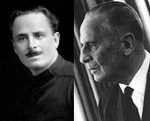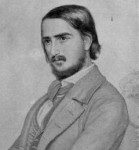 More about Sander Gilman and what drives him, from How Even ‘Good’ Stereotypes Can Be Bad; Myriad Subjects With a Common Thread: The Images We Build to Define Ourselves, New York Times, 21 November 1998:
More about Sander Gilman and what drives him, from How Even ‘Good’ Stereotypes Can Be Bad; Myriad Subjects With a Common Thread: The Images We Build to Define Ourselves, New York Times, 21 November 1998:
When ”The Bell Curve” was published in 1994, black groups angrily protested the authors’ suggestion that because black people score lower on intelligence tests, they have genetically inferior mental capacities. But amid the outcry, Sander Gilman spotted what he thought was an equally insidious assumption about Jews. Although the book seemed to pay Ashkenazi Jews a compliment by implying they are smartest because they score highest on intelligence tests, Mr. Gilman, who studies stereotypes, was troubled.
”I thought, ‘This is really scary stuff!’ ” he said. ”This pseudoscience had come back with a vengeance. Positive stereotypes are just as powerful a means of control as negative stereotypes.”
Mr. Gilman said his interest in stereotypes grew out of his childhood in New Orleans. His mother was born in Poland; his father, a truck driver, was American-born of Russian descent. Mr. Gilman said he grew up as a ”double outsider, between white and black.”
”Even though I may have appeared white,” he said, ”I was along this fissure line because being a Jew in the South was not being white.” The Ku Klux Klan was both anti-Jewish and anti-black. Not only that, but he was also acutely aware of the class distinctions between New Orleans’s well-established German Jewish community and its newer Eastern European Jews. Even within his group, Mr. Gilman said, he ”realized that some people were whiter than other people.”
His sense of the power of stereotypes was heightened by the civil rights movement when as a teen-ager he was involved in sit-ins in New Orleans and ”I saw what ugly stereotypes could do.”
During the 1970’s, Mr. Gilman came across photographs of insane people from the 19th century. ”There was a theory in the 19th century that crazy people always look different.” As a result, he wrote ”Seeing the Insane,” about images of the insane in painting and photography.
With that book, he said, ”I started thinking about broader questions of stereotyping, the psychology of what happens when stereotypes begin to be internalized.” He said he realized that he had been avoiding the personal stake he had in his scholarship, his own Jewishness. He began studying how Jews responded to stereotypes of themselves.
”Jewish Self-Hatred: Anti-Semitism and the Hidden Language of the Jews,” published in 1986, was a study of Jewish writers from the 15th century to the present. ”In every case, the Jew is told either directly or implicitly that because he is inherently different, he can never have command of the language of the culture. One reaction is to become better than, not just as good as.”
Jews are neurotic about the physical differences that distinguish them from others, denying that such differences exist or are significant while discussing them at length and spending great deals of money to surgically alter themselves.
Their resentment of the Whites they’re trying to fool comes out in the recurring anti-White slur that can be found in their complaining: shiksa.
Shiksa Goddess, from Television Tropes & Idioms:
The tendency of some Jewish male characters in media to be paired with possibly non-Jewish female characters (“Shiksa” in Yiddish.) These women are often blonde and blue eyed (although shiksas need not be albino, just non-Jewish). Jewish society traditionally looks down on its members marrying outside the faith, and, since early Jewish comedy writers were almost always male, it stands to reason that they would be the ones depicted marrying out.
Note: The word “shiksa” comes from a Hebrew word meaning “abomination,” so it’s generally considered rude to call a non-Jewish woman that.
The meaning of the word is clear from the context in which it is used. They are looking down on non-jews, especially the blonde, blue-eyed goddesses that jewesses see themselves in competition with.
As White power has declined and jewish power increased, some jews no longer see the value in trying to pass for White.
As Ethnic Pride Rises, Rhinoplasty Takes a Nose Dive, Jane Gross, New York Times, 3 January 1999:
The heyday for nose jobs, experts agree, was in the 60’s and early 70’s, when the post-war baby boomers were teen-agers. Parents of Jewish ancestry who knew first-hand of the Nazi atrocities were ever on the alert for stirrings of anti-semitism.
They wanted their own children spared discrimination. And to them, that meant fitting inconspicuously into the Protestant mainstream. ”Jewish parents at that time didn’t want their children to look Jewish,” said Dr. James L. Baker Jr., who practices outside Orlando, Fla. ”They feared a stigma left from the war.”
The physical characteristic that most set Jews apart was their noses, and so legions of teen-agers, usually girls, had them fixed. The technology was primitive compared to today’s and so the results, through the 1970’s, had a cookie-cutter similarity — little ski-jump noses with the bony bridge scooped away.
But that was O.K. with the patients. ”Everybody wanted to look like a shiksa,” said Dr. Thomas D. Rees, a retired plastic surgeon who trained many of the high-priced doctors at work today along Park Ave.
Dr. Antell said he sees older women who have tired of their cute little ski-slope noses and ”want to turn the clock back” and look like real people.
To jews, “shiksas” and their “cute little ski-slope noses” (another recurring term in jewish complaints about the jewish nose) aren’t “real people”.
It’s difficult to imagine White women wanting to look like kikesses, with some eventually getting tired of their giant beaks and wanting to look like real people again. It’s impossible to imagine the New York Times would ever describe it that way, even if it were owned and operated by real people.
Making the Cut, Keren Engelberg, Jewish Journal, 20 January 2005:
Forget the bar mitzvah. Today, nose jobs for American Jews have become so ubiquitous a rite of passage, they’re a cliché.
Jews, who have always had a love/hate relationship with plastic surgery — and their own appearance — have helped create a trend that has now exploded into the mainstream. They were “early adopters” of a surgical technology that has since gone from rare to ubiquitous, from stigmatized to embraced. Jews, out of their very desire to appear less Jewish, made plastic surgery acceptable to the very people whom they were trying to look like.
“Certain kinds of noses speak Jewishness…. Jews assimilating into a largely gentile culture thus strip from our features the traces of our ethnicity. We have other aesthetically assimilating rituals. We straighten curly hair, dye dark hair light. We get very thin to disguise what we often imagine are Jewish-coded thighs and hips. What we choose to treat are precisely the features that are culturally selected as our distinguishing physical traits,” writes Virginia L. Blum in her book “Flesh Wounds: The Culture of Cosmetic Surgery” (University of California, 2003).
Historically, Blum is correct in her observation. This has been our tradition, but in the early years of plastic surgery, it was a survival mechanism against anti-Semitic eugenic philosophies as much as an effort at social acceptance. Supposed ethnic identifiers like Jewish or Irish noses and “Dumbo ears” were a major target of plastic surgery in its earliest stages, as were facial deformities resulting from disease or genetics.
With the advent of antisepsis and anesthesia in the late-18th century, the science of plastic surgery truly began to flourish, with nose jobs the major focus. The first real nose job by modern standards was performed in 1885, by Jaques Joseph, a Jewish surgeon, on a Jewish patient. Other doctors worked to help rid the Irish of the “pug nose” and Jews of “a large, massive, club-shaped, hook nose,” to quote one eloquent anthropologist of the time, Robert Knox.
The ubiquitous fixing of the ubiquitous jewish nose that everybody but jews is supposed to pretend doesn’t exist.
Love/hate is symptomatic of the dual nature of jewish identity – jews love being jews and hate having to hide it. They love themselves and hate the blonde, blue-eyed shiksas with the cute ski-slope noses.
A Bridge Too Far: Jewish Teenagers Are Saying No to Nose Jobs, Rita Rubin, Tablet Magazine, 7 June 2012:
For generations, Jewish girls from well-off families underwent a special rite of passage, one that fell somewhere between their bat mitzvahs and their weddings: their nose jobs. But according to a set of recent statistics, that may be changing: Far fewer nose jobs are being performed than just a decade ago—in what may reflect shifting standards of beauty and perhaps even Jews’ diminishing dissatisfaction with what they see in the mirror.
Indeed, anecdotal evidence seems to confirm that nose jobs are not the status symbol they once were among Jews. “It was like a rite of passage, and it’s not that anymore,” said Babak Azizzadeh, a plastic surgeon in Beverly Hills, who says he no longer sees Jewish parents pushing their teenage children to get rhinoplasty the way they used to.
“It seems likely that the number of Jewish nose jobs has gone down,” said Emory University physician and anthropologist Melvin Konner, author of The Jewish Body. “It’s fair to say that this was once a lot more routine for Jewish girls than it is now.”
Konner goes on to suggest a reason behind the changing attitude toward nose jobs: “I think it’s because of increased ethnic pride and a decreased desire to stop looking Jewish and blend in,” he said, “which is why rhinoplasty was invented.”
“The WASPs are becoming a minority,” said filmmaker Gail Kirschenbaum—and that means that old standards of beauty are changing. “It’s not about trying to have the WASPy nose anymore. What is acceptable and considered beautiful is different now.”
When Haiken was working on Venus Envy, she perused women’s magazines from the ‘30s, ‘40s, and ‘50s; comparing them to women’s magazines today, she noted a definite increase in the diversity of women’s images: “You see Asian models, you see African-American models. You never used to at all.” However, Haiken pointed out, as far as fashion models go, “you don’t see a lot of hooked noses, thick lower lips—the kind of features that are caricatures for Jews.”
Those are jewish characteristics. Caricatures only work to the extent they exaggerate real characteristics.
The Decline of the Jewish Girl Nose Job, Katie J.M. Baker, Jezebel, 7 June 2012:
“I think it’s because of increased ethnic pride and a decreased desire to stop looking Jewish and blend in,” said Emory University physician and anthropologist Melvin Konner, author of The Jewish Body, “which is why rhinoplasty was invented.” Another historian told Tablet that ethnic men and women, like Jews, Italians, and Greeks, used to feel pressure to look like WASPs due to anti-immigration sentiment. But now most U.S. children under a year old belong to racial or ethnic minorities, meaning upturned noses are increasingly less prominent — and, therefore, less desirable.
Kids don’t care so much about looking “All American” anymore. Maybe Lea Michelle is the new Grace Kelly! (Okay, that could be a stretch. But, you know, aesthetically speaking.) “The ideal beauty can be anybody,” said Babak Azizzadeh, a plastic surgeon in Beverly Hills, aka nose-job Mecca. “I think people actually don’t want to assimilate as much.” He writes on his practice’s website that Jewish patients want to keep “their ethnic identity intact.”
At the same time, as national rates go down, more Orthodox Jews feel comfortable getting the surgery because modern rabbis are giving them the go-ahead. One doctor said less religious Jews ask him for eyelid lifts and chin implants, but Orthodox Jews always want nose jobs.
The sentiment seems especially odd coming from the man who produced a pop-punk music video called “Jewcan Sam.” Yes, you heard me — it’s real, and it’s spectacular. (And you really have to see it to believe it, but be warned: the catchy refrain will definitely get stuck in your head.) In the video, the lead singer’s dream girl will only date him if he gets a nose job. “You’ve got a beak like Jewcan Sam. I only go with guys with perfect upturned noses … I will love you till forever if you get your nose circumcised,” the song goes. At the end (SPOILER ALERT), the singer does get the operation — although he still doesn’t get the girl, because she “only dates football players.” What a shiksa.
How to Celebrate Passover, Jewish-Atheist Style, Katie J.M. Baker, Jezebel, 6 April 2012:
When I was eight years old, my best friend’s mother told me, over a spaghetti dinner, that my dad wasn’t Jewish because he didn’t believe in God.
“Yes he is,” I said.
“But he’s an atheist, right?” she asked.
“Yeah,” I said, twirling noodles around my fork.
“Then he can’t be a Jew,” she said, rather definitively, for a Catholic. I burst into tears at the table.
My father has always been very open with me about his atheism, even when I was younger and still believed in a higher power. Whenever I’d ask, “But how do you know there’s not a God?” He’d say, “I don’t. How do you know there’s not a giant pickle behind the sun?” Still — at least in my mind — he was undeniably as much of a Jew as my mother, brother, and I. I had seen his Bar Mitzvah photos. Some of his ancestors had died in the Holocaust. He refused to let us get a Christmas tree because it made him feel (irrationally, he’d admit) uncomfortable. We celebrated Passover, Hanukkah, and the High Holidays every year, sometimes even attending temple services if any of my grandparents were in town. My dad also looks like a mix between Paul Simon and Raffi: in other words, like a mega, mega Jew. So, growing up, I never equated being Jewish with being religious — the former was a huge part of my cultural identity, while the latter was a concept I didn’t quite understand. I may not cry over it anymore, but I still have a difficult time reconciling my Judaism with my feelings about organized religion.
Jewish plastic surgeon in trouble over YouTube song on nose jobs, Haaretz:
In the video clip, yarmulka-wearing Staiman tries to woo a blonde woman, but is rejected.
“Jewcan Sam” – named after “Toucan Sam,” the cartoon mascot for Froot Loops breakfast cereal with a bulging, multicolored beak – has reportedly sparked uproar among some American Jews, who say the song perpetuates a stereotype that does not need any more publicity.
Andrew Rosenkranz, the Florida director for the Anti-Defamation League, called the five-minute video “hurtful” for featuring a Jewish young man who is rejected by a fetching young woman because of his beaky nose, the Huffington Post wrote.
“For hundreds of years Jews have been depicted negatively with distorted features, including large hooked noses,” Rosenkranz was quoted as saying. “It’s a physical trait that is associated with the image of the Jew as someone who doesn’t belong, someone who is alien.”
The Most Talked-About Jewish Nose Jobs, Jewcy:
Sarah Jessica Parker: From Girls Just Want To Have Fun to women just want to go to Abu Dhabi.
Tori Spelling: Beverly High’s own Donna Martin becomes a reality TV star.
ScarJo: The big screen’s Russian-born Black Widow whose maternal family comes from Minsk IRL.
Natalie Portman: the Israeli-born, Long Island-bred actress formerly known as Natalie Hershlag.
Jennifer Grey: the Dalton grad who will always be Baby to us.
According to Bernice Schrank, author of the academic paper “Cutting Off Your Nose to Spite Your Race,” many actors and actresses get their noses fixed to “pass” as a member of the dominant race — and play non-ethnic roles.
The author cites Jewish actress Sarah Jessica Parker’s changed looks as part of her success in playing non-ethnic New Yorker Carrie Bradshaw in the smash hit series “Sex and the City.”
This is a paper about “Jewish noses” and how perceptions of them have varied in American popular culture in the twentieth century. The importance of the “Jewish nose” is that it is perceived as one of the most obvious defining feature of Jews. Jews with non-Jewish noses are able to “pass”, by which I mean being able to blend into the dominant culture and thereby being able to become invisible as Jews.
Dirty Dancer Grey’s Nightmare Nose Job, Contactmusic.com:
DIRTY DANCING star JENNIFER GREY’s Hollywood dreams were shattered after a “nose job from hell” changed her appearance so drastically, she looked nothing like her former self.
The 1980s star’s promising career ground to a complete halt overnight in the early 1990s because suddenly nobody recognised her – and even friends would blank her when she bumped into them.
She says, “I went in the operating theatre a celebrity – and come out anonymous. It was like being in a witness protection program or being invisible.
Ethnic Makeovers: Women and Jewish Noses in Hollywood, Pygmalion’s Fantasy.
‘I may be striking – but I’d rather be pretty’, Katie Grant, The Independent, 27 November 2012:
For most of my life, I’ve fantasised about trading in my prominent Jewish nose for a less conspicuous model. I distinctly remember craning my neck aged seven to examine my profile in the mirror one day, and noticing for the first time that, instead of following a clean geometric line ending in a neat point like the other girls in my class, my nose featured a noticeable hump on its bridge before curving downwards into an unsightly hook shape. “I’m the Wicked Witch of the West!” I realised, horrified.
“Don’t worry, you’ll see a vast improvement. I can absolutely make your nose more beautiful, less Jewish and unattractive.” I stormed out, furious. Shattered ego aside, I was appalled that Mr S clearly equated Jewishness with ugliness – it didn’t strike me until later that he had in fact articulated my own private worries.
Over the years, the phrase “Jewish nose” has somehow become shorthand among medical practitioners to denote a race-based physical deformity. In the lead up to the Second World War, as anti-Semitism became increasingly widespread, it became commonplace for Jewish immigrants to undergo surgery to escape social and economic alienation.
In her essay The “Jewish Nose” and Plastic Surgery: Origins and Implications, Beth Preminger explains: “By incorporating this term into their clinical vocabulary, early plastic surgeons unwittingly lent scientific credibility to popular stereotypes about beauty and ethnicity.”
Consequently, the “Jewish nose” was transformed into a “pathological condition for which there existed a medical protocol for correction”.
The Nose Job Jew, YouTube.
On the Nose: A True Story, Nice Jewish Mom:
My pride in being Jewish is as plain as the nose on my face. The nose on my face, however, is not actually mine.
There, I’ve said it. I’ve come clean after nearly four decades. That’s how long it’s been since my nose was “done.”
I’ve remained embarrassed about having had the surgery all my life.
I’m still ashamed to this day, although no longer to the point of needing to lie. How sad it is to be surgically altered rather than learn to take pride in who you are or how you look.
Next to my older brother’s whopper of a snout, mine was a mere Whopper Junior. Why, I eventually asked my mother, wasn’t his nose ever altered, too?
“No comment,” she replied, with an uncomfortable laugh. Neither was she forthcoming on another perplexing area: Why, when my parents were harping incessantly about the need for me to marry a fellow Jew, did they need to make me look less Jewish?
For isn’t that, in essence, what Jews having nose jobs is all about? (Or, as my above-mentioned, extremely direct friend Suzanne insists, isn’t it about Jewish men lusting after Gentile women – fine-featured shiksa goddesses?)
This, though, is what I really want explained: I went on to marry a nice Jewish man. Meanwhile, my brother, with his muzzle intact, ended up marrying a Catholic. Ironic? Yes.
Rhinoplasty – A Woman Tells Why She Resisted a New Nose, Lisa Lewis, ELLE, 27 April 2010:
Yet by 2006, when I was 24, single, and working in film production in New York City, it became clear that my mother wasn’t the only one who reacted negatively to my nose. People stopped me on the street to tell me I looked like Barbra Streisand. Japanese tourists wanted to take pictures with me. Hairstylists told me I needed to play down my nose—“no offense.” I started writing down the unprovoked remarks in a journal; in one year, I recorded 59.
September 23, 2006
Gay man at a party in Williamsburg: “Damn, girl, why you never got that thing taken off?”
A woman overhearing: “I like it, don’t get it fixed.”
Her friend: “You’re Jewish, right?”
Dreyfus, Kant and Nose Jobs, ck, Jewlicious, 13 Jan 2006:
Sander Gilman considers philosophical and historical questions rarely broached by cosmetic surgeons or their patients. He looks at how new notions of race, beauty, and happiness arose in the 18th and 19th centuries, and how these turned “the Jewish nose” into an obsession for Jews and non-Jews alike. How are ideals of beauty informed by notions of race and ethnicity? How does external appearance relate to emotional well-being? And how has plastic surgery affected debates about Jewish identity?
The Jewish nose an obsession for non-Jews? Consider Alfred Dreyfus, he of the notorious Dreyfus affair that inspired a certain Austrian journalist named Herzl to found a new movement. Dreyfus’ nose in the photo is unremarkable, but it takes on leviathan proportions in the minds of anti-semitic French caricaturists (see below).
I think what we can learn from all this is that haters will hate, no matter what. Anti-Semitism and other forms of hate are innately irrational. Dreyfuss had an ordinary nose, and they still depicted him in the most grotequely anti-semitic way possible. German Jews pioneered nose jobs and 45 years later they were being shoved into ovens by the people whose approval they sought.
Why I’ ll Never Get a Nose Job, Lisa Miya-Jervis, from the book Adiós, Barbie, July-August 1999:
My big honkin’ nose makes it clear I’m Jewish—and I wouldn’t change it for the world
I’m a Jew. I’m not even slightly religious. Aside from attending friends’ bat mitzvahs, I’ve been to temple maybe twice. I don’t know Hebrew; my junior-high self, given the option of religious education, easily chose to sleep in on Sunday mornings. My family skips around the Passover Haggadah to get to the food faster. Before I dated someone from an observant family, I wouldn’t have known a mezuzah if it bit me on the butt. I was born assimilated.
But still, I’m a Jew, an ethnic Jew of a very specific variety: a godless, New York City–raised, neurotic middle-class girl from a solidly liberal-Democratic family, who attended largely Jewish, “progressive” schools. When I was growing up, almost everyone around me was Jewish; I was stunned when I found out that Jews make up only 2 percent of the American population. For me, being Jewish meant that on Christmas Day my family went out for Chinese food and took in the new Woody Allen movie. It also meant that I had a big honkin’ nose.
Their lust for the button nose is probably more a desire for a typical femininity than for any specific de-ethnicizing. But given the society in which we live, the proximity of WASPy white features to the ideal of beauty is no coincidence. I think that anyone who opts for a nose job today (or who pressures her daughter to get one) would say that the reason for the surgery is to look “better” or “prettier.” But when we scratch the surface of what “prettier” means, we find that we might as well be saying “whiter” or “more gentile” (I would add “bland,” but that’s my personal opinion).
Even though I know plenty of women with their genetically determined schnozzes still intact, sometimes I still feel like an oddity. From what my mother tells me, nose jobs were as compulsory a rite of passage for her peers as multiple ear-piercings were for mine. Once, when I was still in high school, I went with my mother to a Planned Parenthood fund-raiser, a cocktail party in a lovely apartment, with lovely food and drink, and a lovely short speech by Wendy Wasserstein. But I was confused: We were at a lefty charity event in Manhattan, and all the women had little WASP noses. (Most of them were blond, too, but that didn’t really register. I guess hair dye is a more universal ritual.)
“Why are there no Jewish women here?” I whispered to my mother. She laughed, but I think she was genuinely shocked. “What do you mean?” she asked. “All of these women are Jewish.” And then it hit me: It was wall-to-wall rhinoplasties. And worse, there was no reason to be surprised. These were women my mother’s age or older who came of age in the late ’50s or before, when anti-Semitism in this country was much more overt than it is today. Surface assimilation was practically the norm back then, and those honkers were way too, ahem, big a liability on the dating and social scenes.
Only once did I feel uneasy about being “identified.” At my first job out of college, my boss asked, after I mentioned an upcoming trip to see my family, “So, are your parents just like people in Woody Allen movies?” I wondered if I had a sign on my forehead reading “Big Yid Here.” His comment brought up all those insecurities American Jews have that, not coincidentally, Woody Allen loves to emphasize for comic effect: Am I that Jewish? I felt conspicuous, exposed. Still, I’m glad I have the sign on my face, even if it’s located a tad lower than my forehead.
Judaism is the only identity in which culture and religion are supposedly bound closely: If you’re Irish and not a practicing Catholic, you can still be fully Irish; being Buddhist doesn’t specify race or ethnicity. To me, being a Jew is cultural, but it’s tied only marginally—even hypothetically—to religion, and mostly to geography (New York Jews are different from California Jews, lemme tell ya). So what happens when identity becomes untied from religion? I don’t know for sure. And that means I’ll grab onto anything I need to keep that identity—including my nose.
Af – A documentary about Jewish noses, YouTube:
What does it mean to have a Jewish nose, and what does it mean to want to change it?
The podcast will be broadcast and available for download on Tuesday at 9PM ET.
Podcast: Play in new window | Download


















